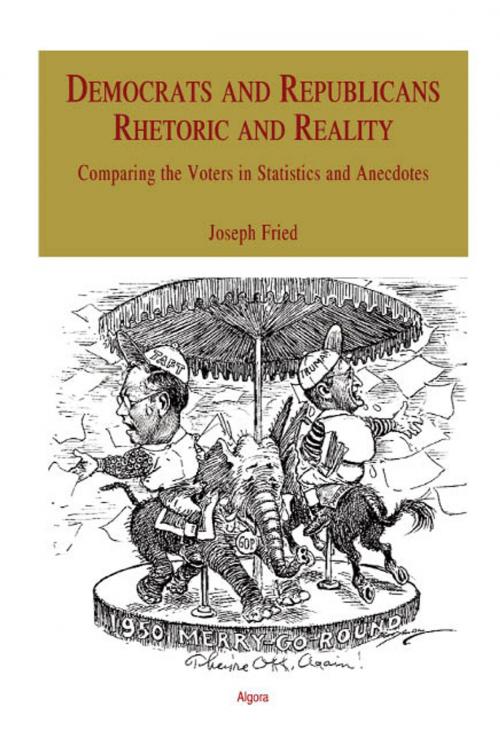Democrats and Republicans - Rhetoric and Reality
Comparing the Voters in Statistics and Anecdotes
Nonfiction, Social & Cultural Studies, Political Science, Government, Political Parties| Author: | Joseph Fried | ISBN: | 9780875866055 |
| Publisher: | Algora Publishing | Publication: | December 15, 2009 |
| Imprint: | Algora Publishing | Language: | English |
| Author: | Joseph Fried |
| ISBN: | 9780875866055 |
| Publisher: | Algora Publishing |
| Publication: | December 15, 2009 |
| Imprint: | Algora Publishing |
| Language: | English |
Are Democrats more tolerant than Republicans? Are they more intelligent? Who spends more time at work and who spends more time watching TV? Why are Republicans happier? Who benefits more from Social Security? All of these questions, and many more, are answered in Democrats and Republicans Rhetoric and Reality. It uses authoritative survey evidence and statistics to compare the conduct and achievements of the Democratic and Republican constituencies.
Many of the findings are surprising. For example, Democrats and Republicans have different tendencies with regard to trust, self-esteem, "apparent intelligence," political knowledge, mental health, happiness, work hours, charity, and even body mass index. These general differences are quantifiable and statistically significant. The author principally relied on data from the General Social Survey and the American National Election Studies, rounded out by surveys conducted by the Pew Research Center for the People and the Press, the Gallup Organization, the Institute for Public Policy and Social Research, Harris Interactive, and other organizations.Although the book is aimed at the popular market, it has all of the supporting references and statistical significance of an academic work. Interspersed among the findings are quotations from pundits, politicians, philosophers, celebrities, fruitcakes, etc. Although some of this rhetoric is strident, the book's overall tone is objective a refreshing alternative to the bombastic polemics we often see in modern political works. The last chapter comprises several constructive lessons that can be learned from the various Democratic-Republican comparisons.
This is the most comprehensive and authoritative book written about the constituencies of our two major political parties. It should be in the personal library of anyone who is interested in American politics.
Are Democrats more tolerant than Republicans? Are they more intelligent? Who spends more time at work and who spends more time watching TV? Why are Republicans happier? Who benefits more from Social Security? All of these questions, and many more, are answered in Democrats and Republicans Rhetoric and Reality. It uses authoritative survey evidence and statistics to compare the conduct and achievements of the Democratic and Republican constituencies.
Many of the findings are surprising. For example, Democrats and Republicans have different tendencies with regard to trust, self-esteem, "apparent intelligence," political knowledge, mental health, happiness, work hours, charity, and even body mass index. These general differences are quantifiable and statistically significant. The author principally relied on data from the General Social Survey and the American National Election Studies, rounded out by surveys conducted by the Pew Research Center for the People and the Press, the Gallup Organization, the Institute for Public Policy and Social Research, Harris Interactive, and other organizations.Although the book is aimed at the popular market, it has all of the supporting references and statistical significance of an academic work. Interspersed among the findings are quotations from pundits, politicians, philosophers, celebrities, fruitcakes, etc. Although some of this rhetoric is strident, the book's overall tone is objective a refreshing alternative to the bombastic polemics we often see in modern political works. The last chapter comprises several constructive lessons that can be learned from the various Democratic-Republican comparisons.
This is the most comprehensive and authoritative book written about the constituencies of our two major political parties. It should be in the personal library of anyone who is interested in American politics.















